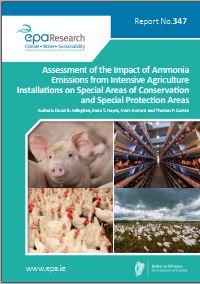
Authors: David B. Kelleghan, Enda T. Hayes, Mark Everard and Thomas P. Curran, December 2020
Year: 2020
Atmospheric ammonia poses a significant threat to biodiversity and human health. Concentrations of ammonia in the air downwind of hotspot sources, such as pig and poultry farms, are likely to negatively affect the environment. This project quantified and assessed the impact of ammonia emissions from intensive pig and poultry units in Ireland by monitoring detailed ammonia emissions from 17 animal production houses across four farms.
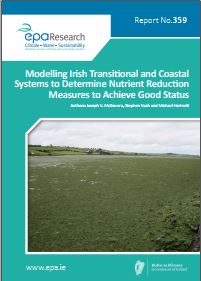
Authors: Joseph V. McGovern, Stephen Nash and Michael Hartnett, December 2020
Year: 2020
In this project three Irish estuaries were modelled with the aim of quantifying the impact on water quality of existing nutrient loading from direct and diffuse inputs. Recommendations on the necessary nutrient load reductions to improve estuarine water quality and the appropriate pressure to target in nutrient load reductions for the three systems studied are provided.
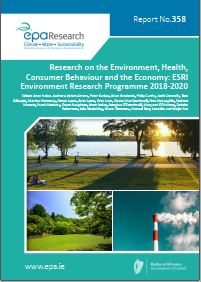
Authors: Achim Ahrens, Peter Barlow, Brian Broderick, Philip Carthy, Aoife Donnelly, Tom Gillespie, Martina Hennessy, Ronan Lyons, Seán Lyons, Pete Lunn, Ciarán Mac Domhnaill, Finn McLaughlin, Stefano Meneto, Frank Moriarty, Owen Naughton, Anne Nolan, Aonghus O´Domhnaill, Margaret O’Mahony, Deirdre Robertson, Iulia Siedschlag, Shane Timmons, Manuel Tong Koecklin and Weijie Yan. Editor: Anne Nolan, November 2020
Year: 2020
The EPA/ESRI Environment Research Programme brings together a diverse set of research topics with the objective of assessing the ways in which the environment interacts with economic and social processes. This report provides a detailed summary of the 12 topics examined in the second phase of the programme, which was carried out between 2018 and 2020.
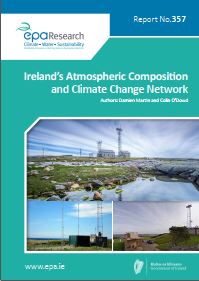
Authors: Damien Martin and Colin O’Dowd, November 2020
Year: 2020
The Atmospheric Composition and Climate Change network is a valuable established national research and monitoring infrastructure. This fellowship has enabled and sustained scientific work on a national monitoring network. Infrastructure has been continually developed over the course of the fellowship that will facilitate long-term sustainable measurements.
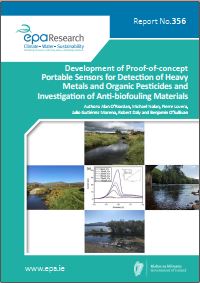
Authors: Alan O’Riordan, Michael Nolan, Pierre Lovera, Julio Gutiérrez Moreno, Robert Daly and Benjamin O’Sullivan, November 2020
Year: 2020
One important challenge in the 21st century is the ability to provide a clean and pollutant-free source of water. This project aimed to develop electrochemical and optical-based sensors for detection of organic contaminants (herbicides) and heavy metals. This research has shed light on the potential for the development and optimisation of novel environmental sensors and anti-biofouling strategies.
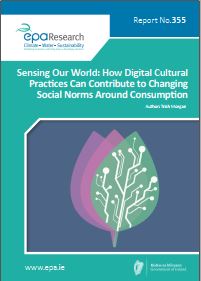
Author: Trish Morgan, November 2020
Year: 2020
This research project assesses the potential for novel cultural practices to communicate environmental data and issues to the public in Ireland against the backdrop of local and international environmental pressures. It makes recommendations towards developing solutions to the communication of environmental data to publics and developed a solution in the form of an online database of novel cultural practices.
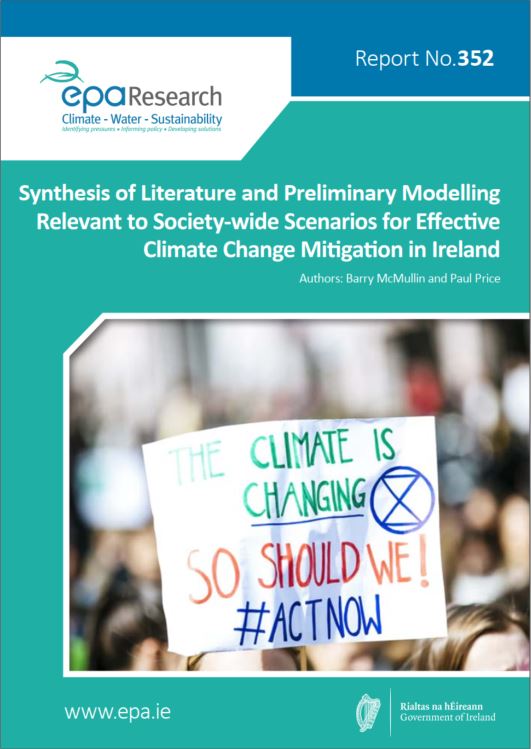
Authors: Barry McMullin and Paul Price, November 2020
Year: 2020
Rapid global warming due to emissions of greenhouse gases (GHGs) caused by human activities is negatively affecting global climate and ecological systems. This research assesses the international literature to inform climate mitigation policy in Ireland and provides a preliminary tool for comparing policy within the Paris Agreement commitments.
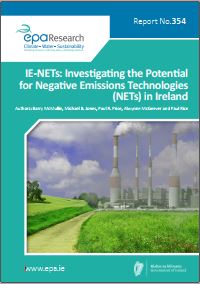
Authors: Barry McMullin, Michael B. Jones, Paul R. Price, Alwynne McGeever and Paul Rice, November 2020
Year: 2020
It is now scientifically understood that effective climate action sets a finite limit on total future net emissions of carbon dioxide (CO₂) from human activities, and may require dependence on large-scale “negative emissions” or CO₂ removal from the atmosphere. The IE-NETs project provides the first review of the technical potential for CO₂ removal in Ireland and an assessment of the security of long-term carbon storage.
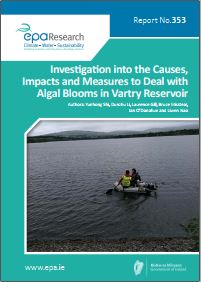
Authors: Yunhong Shi, Dunzhu Li, Laurence Gill, Bruce Misstear, Ian O’Donohue and Liwen Xiao, November 2020
Year: 2020
Vartry Reservoir is a very important drinking water source in Ireland. This project collected and analysed historical water quality and ecology data from 2016 to 2018 and a series of laboratory experiments were carried out to investigate the causes of diatom blooms to identify the pressures. The study also monitored nutrient levels in both the feeding rivers and the reservoir.
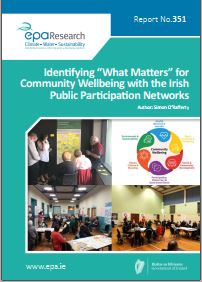
Author: Simon O’Rafferty, October 2020
Year: 2020
The Public Participation Networks (PPNs) were established through the 2014 Local Government Reform Act in order to “provide a mechanism by which citizens can have a greater say in local government decisions which affect their own communities”. This report presents the findings from an action research project in which a toolkit to develop visions of community wellbeing was co-designed with four PPNs.
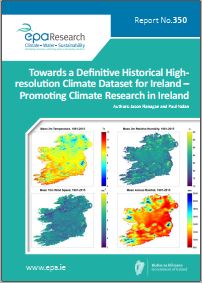
Authors: Jason Flanagan and Paul Nolan, October 2020
Year: 2020
There is strong and constant demand from various sectors for long-term, high-resolution gridded climate datasets. This report describes the available datasets and how, using a variety of available observational datasets, appropriate uncertainty estimates and skill scores have been calculated for the model outputs.
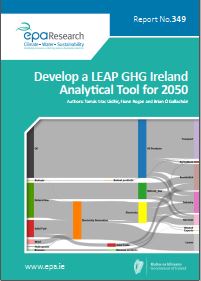
Authors: Tomás Mac Uidhir, Fionn Rogan and Brian Ó Gallachóir, October 2020
Year: 2020
This report describes a greenhouse gas (GHG) emissions model of Ireland’s energy and agriculture sectors, which were responsible for approximately 61 million tonnes (Mt) of GHG emissions in 2017. The Low Emissions Analysis Platform (LEAP) software was used to build the LEAP Ireland 2050 model, which simulates the development of future possible decarbonisation pathways for Ireland.
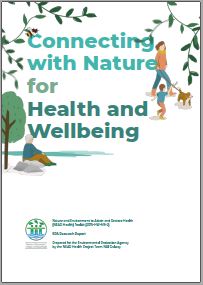
Authors: Caitríona Carlin, Gesche Kindermann, Easkey Britton, Martin Cormican, Christine Domegan, Mike Gormally and Diarmuid O’Donovan, October 2020
Year: 2020
This toolkit accompanies EPA Research Report 348: Nature and Environment to Attain and Restore Health (NEAR Health)
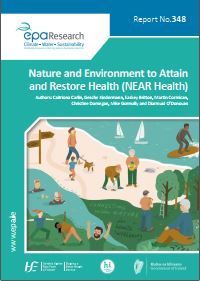
Authors: Caitríona Carlin, Gesche Kindermann, Easkey Britton, Martin Cormican, Christine Domegan, Mike Gormally and Diarmuid O’Donovan, October 2020
Year: 2020
The NEAR Health project was jointly funded by the EPA and the HSE to investigate how nature and environment can help society attain and restore health. It investigated (1) how people value and experience nature, health and wellbeing, (2) the barriers and bridges to connecting with nature, (3) what people want from their healthy future environment and (4) nature-based activities that benefit people’s health and wellbeing.
Year: 2020
Human health protection is a fundamental aspect of environmental protection. Our health is impacted by the air we breathe, the water we drink, the noise levels we experience, the food we eat, the spaces we spend time in, and our sense of wellbeing. This Brochure provides an overview and key findings of the three research projects jointly funded by the EPA and the HSE.
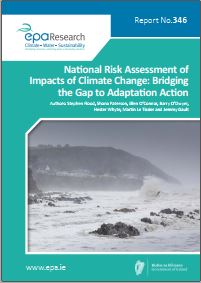
Authors: Stephen Flood, Shona Paterson, Ellen O’Connor, Barry O’Dwyer, Hester Whyte, Martin LeTissier and Jeremy Gault, October 2020
Year: 2020
Ireland’s climate is changing in line with global trends and this trend is expected to continue. This report presents its findings according to the NAF’s four themes: natural and cultural capital, critical infrastructure, water resources and flood risk management, and public health. The impacts of climate change will have direct relevance to the achievement of planning and development objectives and priorities within these themes.
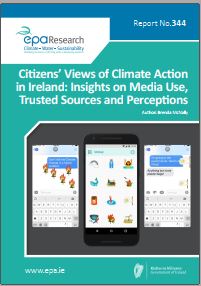
Author: Brenda McNally, September 2020
Year: 2020
As the physical impacts of climate change become more urgent and the subject of wider public concern, greater understanding of the societal responses will be needed. This project investigated citizens’ views of and media consumption about climate actions in Ireland. The report supports environmental policymaking by providing data to tailor communication about climate action and to broaden citizen engagement with climate change.
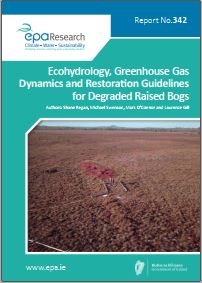
Authors: Shane Regan, Michael Swenson, Mark O’Connor and Laurence Gill, September 2020
Year: 2020
This report presents the results of an integrated scientific study on two raised bogs, Clara Bog, Co Offaly and Abbeyleix Bog, Co Laois, which are considered to be representative of lowland peatland conditions encountered in Ireland. To assess the restoration potential of degraded raised bog systems, and the level of management required to address the degradation, a simplified set of guidelines is provided as a summary in this report.
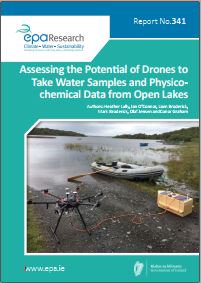
Authors: Heather Lally, Ian O’Connor, Liam Broderick, Mark Broderick, Olaf Jensen and Conor Graham, September 2020
Year: 2020
Water sampling remains a key component in the monitoring and assessment of aquatic environments. Sampling requiring the use of a boat can lead to issues around accessibility, particularly at remote lakes where there may be a lack of a slipway. This research has successfully demonstrated that water chemistry data collected using drone water sampling methods are not statistically different from those produced by boat sampling.
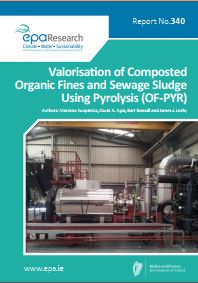
Authors: Marzena Kwapinska, David A. Agar, Bart Bonsall and James J. Leahy, September 2020
Year: 2020
In Ireland, organic “fines” residue, derived from the separation of municipal solid waste and sewage sludge from municipal wastewater treatment plants, are currently processed for disposal as wastes. The Valorisation of Composted Organic Fines and Sewage Sludge Using Pyrolysis project (OF-PYR) investigated the potential of slow pyrolysis as a technology for their treatment as an alternative to other disposal options.